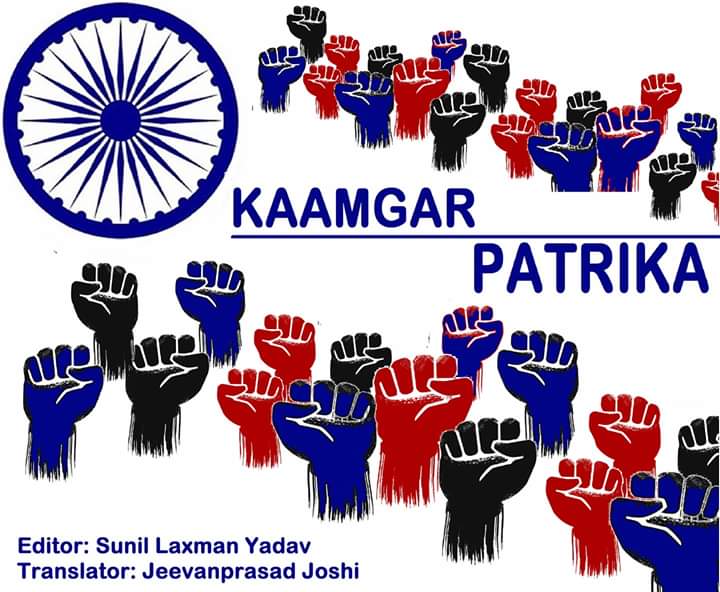Kaamgar Patrika: A magazine of - by - and- for sanitation workers to be launched in Mumbai

By Daisy Katta, TwoCircles.net
The Brihanmumbai Municipal Corporation (BMC) is one of the largest and richest Municipal corporations in the country, with an annual budget of Rs. 27,000 crore and employing 28,000 people as sanitation workers. However, despite the manpower and the money, the condition of over 15,000 of these sanitation workers who work as contract labourers, is dismal . Recently, three sanitation workers died while cleaning a manhole in Thane in the Greater Mumbai area. Manual cleaning and scavenging without safety equipment still remains rampant practice, not only in rural but also in urban areas of Mumbai.
Given the negligence of the government and the media towards the plight of these sanitation workers, Sunil Yadav from Mumbai came up with an idea of a magazine which will be run completely by sanitation workers, under the name Kaamgar Patrika (Workers Magazine). Sunil Yadav, who is currently a PhD student and an activist who has constantly been raising issues faced by a sanitation worker, works with the BMC in the motor loading department and has the first-hand experience of the issues and stigma faced by sanitation workers. Twocircles.net has previously covered Sunil’s journey and achievements as a scholar.
“I had this idea of starting a magazine by sanitation workers for a long time...I also did a degree in journalism, and one of the main objective for that was to articulate and voice the kinds of injustices faced by us. Even Babasaheb Ambedkar used writing as a weapon…I met a few people who were like-minded and most importantly they were Ambedkarites. Although there is a lot of advocacy done and journalists and academics write about sanitation workers, we have not witnessed any change. That is because the narratives of sanitation workers themselves are always missing. So I thought if we have a magazine where the sanitation workers write for and about each other, it would be much more helpful to coordinate and collectively voice our issues,” Yadav says in a conversation with TwoCircles.net.
Yadav, who will also be heading the magazine, further added that the goal of Kaamgar Patrika is to raise the issues that concern sanitation workers. “Mainstream newspapers and TV channels have failed to give us the voice we need to carry out our movement for justice. Whenever some sanitation workers die cleaning sewer lines, septic tanks, or sewage plants, the mainstream newspapers report it only once and briefly. There is hardly any follow-up done to find out if the family members of the victims got justice. Their stories of sufferings never come out. These newspapers never report that most of the sanitation workers are forced to do this work because they don’t get any other job due to the stigma of caste. These newspapers celebrate only if a student tops an exam, but for us even passing an exam is an achievement. Kaamgar Patrika will tell our side of the stories,” Yadav adds.
The magazine is not only meant for the sanitation workers working in the municipal corporation but is open to all people involved in any kind of sanitation work. This magazine will focus on the narratives of sanitation workers, written by the workers themselves. For those who are not able to write, the editorial team will be helping them with the writing. Kaamgar Patrika also aims to encourage the children of sanitation workers to write. Kaamgar Patrika is supported by a team of people from different fields like science, finance and IT some of them are also students working on the subject. The interviews and narratives of sanitation workers will be translated in English, Hindi and Marathi with help of volunteers. Yadav also informs that the entire workload of the magazine will be handled by an editorial team of four people.
The initial issue will be published online four times a month, and later in print. Speaking about the circulation of the magazine, Yadav said that as of now the magazine will be launched in Mumbai because cities like Mumbai are seen as role models for other cities. “But we need to understand that violations are taking place even in cities like Mumbai. There is a large workforce who is working in private sector of Mumbai, especially on a contractual basis and we also want to connect with such people,” he adds.
Yadav also pointed out that very few people were educated, so they were stuck in a chain of slavery, but now many of the sanitation workers are pursuing higher education especially in fields like law. He added, “Recently a Combined Law Admission Test (CLAT) exam was introduced as a mandate to pursue law from open universities, but no one will write about how such measures create exclusion for us workers who wish to study law...no one will write about how even such things are affecting us,” he informs.
The magazine is expected to be launched before the end of November 2018.
Kaamgar Patrika team can be contacted at [email protected]
